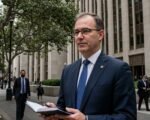A major controversy has erupted at the Glastonbury music festival following reports of inflammatory chants and comments made by performing artists, drawing sharp condemnation from political leaders, including the UK Prime Minister, Keir Starmer. The incidents, occurring over the weekend, have prompted police investigation and sparked debate over free speech and acceptable expression on public platforms.
Incidents Unfold on Stage
The controversy centers on sets performed on Saturday, June 29, 2024. British punk-rap duo Bob Vylan is reported to have led sections of the crowd in chants of “Death, death to the IDF” during their performance. The term “IDF” refers to the Israel Defense Forces, the military force of the State of Israel.
Separately, British police confirmed they are also examining comments made by the Irish rap trio Kneecap. Kneecap has been vocal in its criticism of Israel’s actions in Gaza. Reports indicate that during their set, one member of Kneecap wore a T-shirt supporting the Palestine Action Group. The Palestine Action Group is reportedly facing a potential ban under existing UK terror laws.
Prime Ministerial Condemnation
The outcry reached the highest levels of government on Sunday, June 30, 2024. UK Prime Minister Keir Starmer publicly condemned the actions. Speaking to The Telegraph newspaper, Mr. Starmer stated unequivocally, “There is no excuse for this kind of appalling hate speech.”
He specifically referenced the artists involved, adding that neither Kneecap nor any other performers making threats or inciting violence should be given a platform at events like Glastonbury. Mr. Starmer also called on the British Broadcasting Corporation (BBC), which provides extensive coverage of the festival, to explain its broadcast of these scenes.
Mr. Starmer’s intervention highlights the significant political sensitivity surrounding expressions related to the Israeli-Palestinian conflict, particularly when they involve potentially inflammatory language.
Festival Organizers Respond
Glastonbury organizers addressed the incident involving Bob Vylan, issuing a statement acknowledging the gravity of the remarks. They commented that Bob Vylan’s specific comments “very much crossed a line.”
In response to the weekend’s events, the organizers also issued a clear reminder of the festival’s policy, stating that antisemitism, hate speech, or incitement to violence are not permitted at the event. The statement underscored the festival’s commitment to providing a diverse and inclusive environment while setting clear boundaries on the nature of political expression.
Police Investigation Underway
Authorities have confirmed they are actively looking into the matter. Avon and Somerset police, the force responsible for policing the festival area, confirmed they would be assessing video evidence from Saturday’s performances.
The police investigation aims to determine if any criminal offenses occurred based on the language used and actions taken by the performers. The examination of evidence from both the Bob Vylan set, specifically the chants, and the Kneecap comments and actions, is ongoing.
The legal framework in the UK prohibits incitement to violence and hate speech, and police will be evaluating the incidents against these statutes.
Context and Implications
The incidents at Glastonbury underscore the increasing intersection of major cultural events and highly charged political issues. Music festivals, traditionally seen as platforms for artistic expression and social commentary, are increasingly becoming venues where geopolitical conflicts are referenced, sometimes in controversial ways.
The specific targeting of the “IDF” through chants like “Death, death to the IDF” is viewed by many as crossing the line from legitimate political protest into potentially harmful or inciting language. Critics argue that while artists have a right to express political views, this expression must not veer into hate speech or calls for violence.
Conversely, some proponents of the artists argue that such expressions represent legitimate, albeit provocative, criticism of military actions and policies, and fall under the umbrella of free speech, even if the language is extreme.
The involvement of the Palestine Action Group, a group reportedly under consideration for a ban under UK terror laws, adds another layer of complexity to the Kneecap incident and the broader police inquiry. This potential connection raises questions about the appropriateness of promoting or associating with groups designated under such laws on a mainstream platform like Glastonbury.
Prime Minister Starmer’s call for the BBC to review its coverage also highlights the role and responsibility of broadcasters in covering potentially controversial live events. The question of what constitutes acceptable content for broadcast and how to manage live political expression with potentially offensive elements is a recurring challenge for media organizations.
As Avon and Somerset police continue their assessment of the video evidence, the incidents at Glastonbury are likely to fuel further debate about the boundaries of political expression, the responsibilities of artists and organizers, and the potential legal ramifications of language used on stage at major public events.








